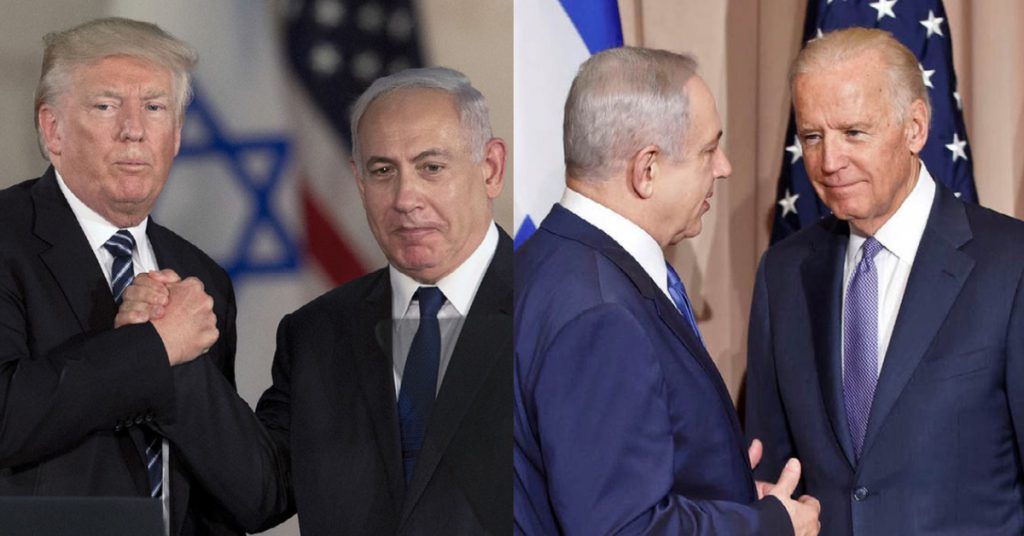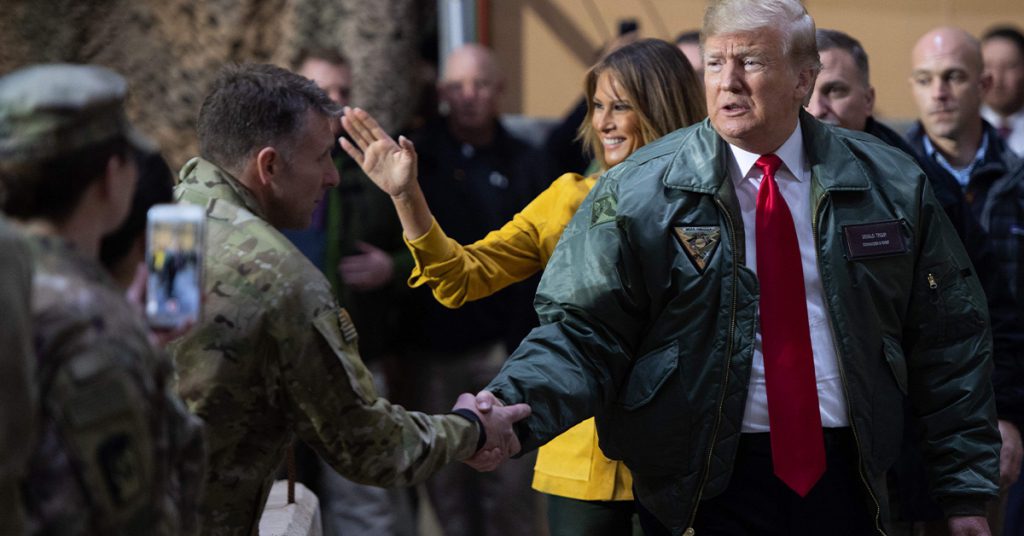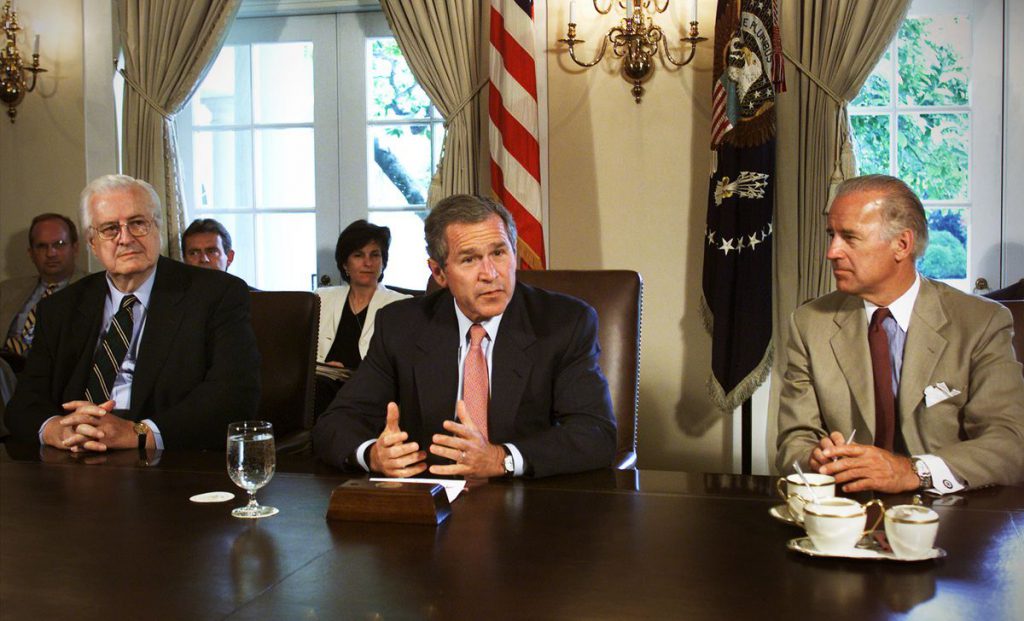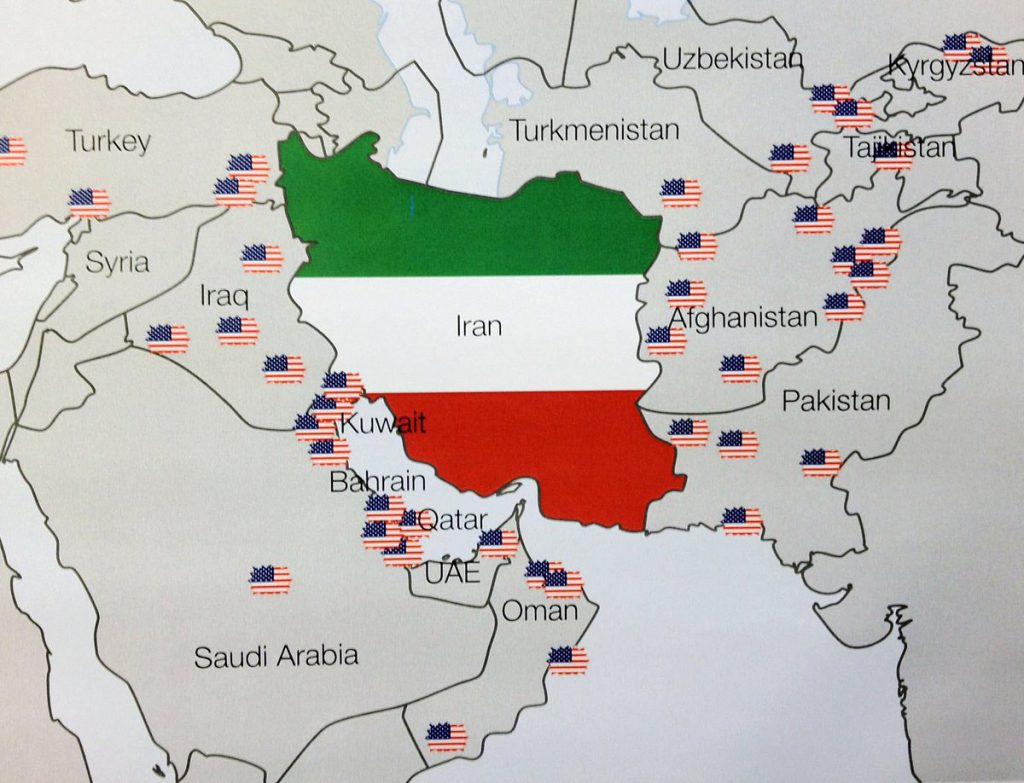US President Donald Trump and Former Vice President Joe Biden met in their first televised debate on September 29. The two touched on a variety of topics, including the future of the Supreme Court, the ongoing COVID 19 pandemic, and the integrity of the 2020 election results. What the two did not touch on, however, was the question of US involvement in the Middle East.
There was no mention of the occupation of Palestine; the ongoing wars in Iraq, Afghanistan, Libya, and Syria; the sanctions levied against Lebanon, Iran, and Syria; or the now-defunct Iranian Nuclear Deal.
Though Biden and Trump clashed bitterly over domestic questions, would there be such a conflict regarding the American role in the Middle East, or do they have more in common? Where do the two presidential candidates fall on the question of American intervention?
The Occupation of Palestine

The new United States Embassy in Israel, recently moved to Jerusalem by Trump, is up and running. This is despite the widespread condemnation of the move from much of the world.
Trump considers the successful move of the embassy from Tel Aviv to Jerusalem to be a crowning achievement. In fact, he went so far as to say “we moved the capital of Israel to Jerusalem,” before going on to admit “that’s for the evangelicals.”
“Biden offers no real policy alternative.”
For Trump, this move, which he views as moving the capital of a foreign country (into territory recognized as occupied by the international community), served the purpose of pleasing his voter base.
Biden’s response to the embassy move seems indicative of his relationship to Trump’s Israel-Palestine policy.
“Moving the embassy when we did without the conditions having been met was short-sighted and frivolous,” Biden told supporters at a virtual fundraiser. “But now that is done, I would not move the embassy back to Tel Aviv.”
So, essentially, nothing would happen. While being critical of tone, tenor, or tactics, Biden offers no real policy alternative. This will prove to be a theme.
In recent months, the Trump government’s policy towards Palestine has been characterized by signing headline-topping normalization deals. The United Arab Emirates and Bahrain have each agreed to normalize relations with Israel –this change is in name only, as the UAE and Bahrain are both effectively US proxy states, siding with Israel against Iran for years and participating in the wars in Yemen and Syria.
Biden, again, offered his support for the policy while coupling a condemnation of Trump as a person.
“I think Trump is going to accidentally do something positive here, in terms of this issue of… other Arab states,” quipped the Democratic candidate. If the Palestinian people are hoping for someone to oppose this growing alliance of US-backed despots and Israeli apartheid, they won’t find it in Biden.
The two follow in the footsteps of all their presidential predecessors.
According to his campaign website, “Biden helped shape the unprecedented $38 billion, ten-year memorandum of understanding for defense assistance to Israel signed in 2016, the largest such military aid package in U.S. history.”
Trump has continued to support this arms deal vigorously, with his administration’s budget promising to “bolster Israel’s capacity to defend itself against threats in the region and maintain its qualitative military edge.”
Trump’s government seems to be striving just as hard to ensure that the United States maintains its own ‘qualitative military edge’ in the Middle East.
Against “Forever Wars”



Both Trump and Biden have committed to ending America’s “forever wars” –a phrase used by both of them– in the Middle East.
More than two years ago, the war in Afghanistan surpassed the Vietnam War as the longest running war in US history. With over 30,000 Afghan civilians dead, and nearly 3,000 killed in the last six months alone under Trump, this particular “forever war” is still taking a heavy toll on the people of Afghanistan.
This imperial bloodletting appears unlikely to abate any time soon. Biden and Trump, despite positioning themselves as opposed to “forever war,” have both committed themselves to maintaining troops in Afghanistan, albeit with a slight caveat.
The two have nearly identical policies, insisting on reducing the overall troop count and “focusing the mission” of US troops in-country on fighting Al-Qaeda. Was this not, however, the initial commitment of the US in 2001?



If the goal is to fight Al-Qaeda, this is the same goal the United States has pursued for nearly two decades. Maybe Trump’s second term, or Biden’s first, will “succeed” following years of American failure.
In the 2008 Democratic Primary, Hillary Clinton’s vote for George Bush’s war in Iraq may have lost her the election to Barack Obama, who opposed the war –while she survived similar criticism from Sen. Bernie Sanders in 2016.
In the 2016 Republican Primary, Donald Trump slammed the entire stage of Republican candidates for their support of the war, despite him also backing the invasion at the time.
Biden’s support for the invasion of Iraq, however, runs far deeper than Donald Trump’s –who, in all fairness, was not in government at the time.
The destruction of Iraq was a long-envisioned goal of Joe Biden’s. As early as 1998, United Nations weapons inspector Scott Ritter was summoned before the US senate.
Biden questioned him, and years before George Bush was even elected, revealed his desire for war in Iraq:
Many of us believe here, as long as Saddam is at the helm, there is no reasonable prospect you or any other inspector is ever going to be able to guarantee that we have rooted out, root and branch, the entirety of Saddam’s program relative to weapons of mass destruction. You and I both know, and all of us here really know, and it’s a thing we have to face, that the only way, the only way we’re going to get rid of Saddam Hussein is we’re going to end up having to start it alone — start it alone — and it’s going to require guys like you in uniform to be back on foot in the desert taking this son of a — taking Saddam down.
Joe Biden, 1998
With Joe Biden having been one of the prime architects of the Iraq War, and Donald Trump supporting it at the time, where does that leave the people of Iraq today?
As late as 2019, Biden was defending his plan to partition Iraq, breaking it into several smaller sectarian nations. Could Biden-Bush have been the American Sykes-Picot?
Donald Trump recently fumed as Iraq’s parliament, after the assassination of Iranian general Qassam Soleimani on Iraqi soil and the deaths of hundreds of thousands of Iraqi civilians, voted to expel US troops from the country.
For someone who claims to oppose “forever wars,” this does not seem like such bad news. Trump, however, threatened Iraq with sanctions if troops were expelled, and recommitted to maintaining thousands of US troops in Iraq.
Biden, on his part, has made a similar commitment in Iraq. He seeks to maintain a presence of Special Forces and military advisors, a phrase certainly reminiscent of the beginnings of the war in Vietnam.
The Obama-Biden administration also opened two new fronts for American empire in the Middle East, Syria and Libya. Both of these recent wars have the potential to expand into new “forever wars.”
America’s Newer Battlefields: Syria and Libya
When the US became involved in Syria in 2011, the goal was reasonably clear: Overthrow Syrian President Bashar al-Assad, and install a regime more cooperative with US interests.
All but the most partisan observers now seem well aware that this is no longer a possibility, if it ever was. The Syrian government in 2011 proved less vulnerable than Iraq’s in 2003.
“Leading the free world requires us to show up, have some skin in the game.”
Where, then, does the US currently stand in relation to Syria? In October of last year, the Trump administration made headlines for their decision to remove US military personnel and weaponry from vulnerable Kurdish territories in Northern Syria.
According to military historian Andrew Bacevich, much of this hardware was merely relocated to the eastern part of the country. What appears to be a withdrawal may turn out to be more of a repositioning.
Once Trump decided to remove –or shift– these forces, the outcry was immediate.
“Leading the free world requires us to show up, have some skin in the game,” Joe Biden said in response, before going on to call Trump a “complete failure.”
Trump’s failure here, according to Biden, was not “having skin in the game” or “showing up.” Judging by his record in Afghanistan and Iraq, Biden is certainly an expert at “showing up.” Leaving? Not so much.
As part of Barack Obama’s administration, Joe Biden certainly also had a role in “showing up” to Libya in 2011. Obama’s war in Libya was one of the more horrific moments in his presidency. Muammar Gaddafi was assassinated, the entire country completely destabilized and plunged into civil war, and much of the country is an open air slave market.
Joe Biden’s role in all this is rather hard to discern, as he alternates between claiming “NATO got it right” in Libya and claiming he “argued strongly against going to Libya.”
Much like Donald Trump’s support then renunciation of the Iraq war, it is difficult to say what his true thoughts are. However, at the end of the day, Joe Biden was the Vice President as Libya was brought to ruin.
Donald Trump has largely picked up where Obama and Biden left off.
As part of his widely expanded and deregulated global drone war, Trump has continued to bomb Libya. Trump has also continued the US’s highly profitable partnership with Libyan-American warlord General Khalifa Haftar.
As a prisoner in Chad, Haftar began to form a plot to overthrow Gaddafi, and as a thank you, the US secured his release in 1990, and granted him American citizenship and a residence in Langley Virginia –a stone’s throw from the CIA headquarters).
The Obama administration brought him back to Libya in 2011, to participate in the bloody civil war.
As Haftar advanced on the Libyan capital of Tripoli in 2019, much of the world feared he would overthrow the internationally recognized and UN-backed government there. Trump, however, gave Haftar a call, congratulating him.
During the call, Trump appreciated, “Field Marshal Haftar’s significant role in fighting terrorism and securing Libya’s oil resources,” according to a statement from the White House.
Trump and Haftar have been largely successful in their attempt to consolidate control over Libyan oil, with the rogue general lifting Libya’s oil blockade just last month. Though as Libya is lifting its blockade, the United States is enforcing blockades throughout the Middle East.
How to Strangle a Nation
Iran perhaps represents the largest challenge to US domination of the Middle East. The United States sponsored a coup in Iran in 1953, overthrowing the democratically elected Mohammad Mosaddegh government, and replacing it with the Western-backed Shah, Mohammad Pahlavi.
The Shah’s brutality, and particularly the horror imposed by the SAVAK, his secret police, was so legendary, that the Shah himself was overthrown in 1979.
He fled to his American benefactors. Of course, given the extensive support supplied to the Shah by the American government (billions of dollars in aid, as well as support for the Shah’s nuclear program), the new Islamic Republic was and remains hostile to the United States.
The birth of the Islamic Republic saw the birth of the US’s extensive sanction regime. Iran is surrounded by American military bases, and effectively shut out of the international monetary system.



These sanctions have had a brutal effect on the Iranian economy, felt hardest by the Iranian people, raising costs of living, decimating their currency, and sending the country into a recession.
The Obama-Biden Administration sought to reduce the sanctions against Iran in the Joint Comprehensive Plan of Action (JCPOA), better known as the Iran Nuclear Deal.
Essentially, sanctions would be lessened over time in return for Iran allowing international inspectors to examine its nuclear facilities. Despite all evidence, the Americans and their proxies, the Saudis and Israelis –who all possess nuclear weapons themselves– are obsessed with the idea that the Iranians are pursuing nuclear weapons.
This should ring familiar with those who followed the build-up to the Iraq War in 2003. That being said, at least the Obama-Biden JCPOA made some headway towards rapprochement.
This may be why Donald Trump tore up the deal upon taking office. Trump has crushed Iran with sanctions even during the COVID-19 pandemic, rendering their medical infrastructure vulnerable, and denying the country life-saving supplies. This is a horrific crime.
While Biden promises a return to the deal his administration negotiated, which would imply better relations between Washington and Tehran, he refused to condemn Trumps political assassination of Iranian general Qassem Soleimani. In fact, Biden tweeted that the general “deserved to be brought to justice for his crimes” and that “no American will mourn Qassem Soleimani’s passing.”
“They share an extensive history of supporting conflict and violence across the Middle East.”
Although Trump’s additional sanctions against the people of Iran may have not gained Biden’s support, his Caesar Act which targets those who do business with Bashar al-Assad’s Syrian government, gathers not just the former Vice President’s support, but that of congress as well.
The Caesar Act represents an obstacle not just for Syrians, but also for Lebanese. Lebanon shares a wide border with Syria, and commerce flows openly between the two states.
As Lebanon plunges further into crisis, with a collapsing currency, devastated port, and political deadlock, neither American candidate seems willing to pause their aggression.
Biden once proclaimed that should Hezbollah, long deemed a “terrorist group” by the US State Department, come to power in Lebanon, aid to the country would be slashed. Trump, similarly, has been placing additional sanctions of officials allegedly connected to Hezbollah.
In a presidential election where both candidates so openly stress their aversion to war, it should be disturbing that they share an extensive history of supporting conflict and violence across the Middle East.
Any attempt to make a final accounting of who, between Biden and Trump, represents a “better” option for those living in the Middle East, or for Americans concerned with their empire’s reach abroad, seems futile.
There seem to be only two serious distinctions between the two’s imperial plans for the Middle East: Iran and Syria.
In Iran, Biden seeks to de-escalate tensions and reduce sanctions, while Trump is barreling towards war.
In Syria, Trump seeks to withdraw troops and bring US involvement to an end, while Biden is the one barreling towards war.
Given that the Syrian and Iranian governments are closely aligned, aggression against one is an escalation towards war with the other. This could render even this modest distinction rather meaningless, in the grand scheme of America’s military plans.
Unfortunately, there is no major political party in the United States opposing American intervention. Anyone seeking to vote against the US empire will have to sit this election cycle out.


